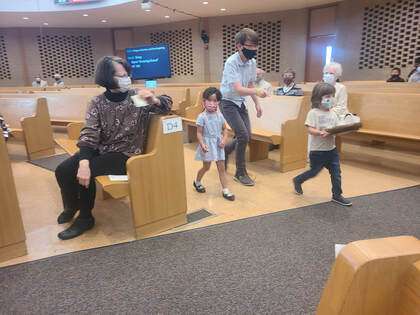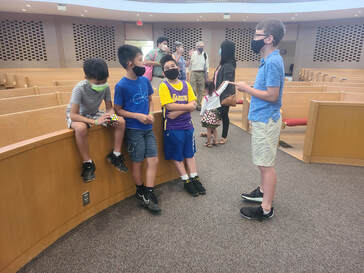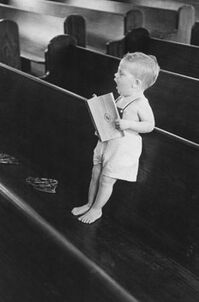july: going to church

We are emerging from a pandemic, from over a year of nothing being “normal.” In the span of a child’s life, this was a REALLY long time. Parenting right now is overwhelming. It’s also an opportunity to take stock of who we want to be and form some new habits. This month’s faith practice is a habit that probably fills us with a mixture of joy, comfort, nerves, and possibly even dread. Going to church.
Being part of a community of faith is part of the life of the Christian. It forms us collectively in the image of God, as God’s kin-dom. Together, we have enough. Together, we can do more for the world. Together, we can discern God’s will. Together, we fill in the gaps for each other, including intergenerational relationships. Being part of a faith community is important, joyful, and hard! This month’s practice helps us remember why we are part of faith communities and why we meet with them regularly. Then it can help us find our new habits.
Being part of a community of faith is part of the life of the Christian. It forms us collectively in the image of God, as God’s kin-dom. Together, we have enough. Together, we can do more for the world. Together, we can discern God’s will. Together, we fill in the gaps for each other, including intergenerational relationships. Being part of a faith community is important, joyful, and hard! This month’s practice helps us remember why we are part of faith communities and why we meet with them regularly. Then it can help us find our new habits.
Pray It
God, thank you for your church. Guide us to be part of what you are doing here in our community. Amen
God, thank you for your church. Guide us to be part of what you are doing here in our community. Amen

Do It
HABITS: Here are some ideas for forming your church-going habits!
* Regularity: Go every week. It’s way easier to go if it’s not a question but an expectation. Children can’t be expected to know what to do or feel at home if they only go once a month!
* Routine: Have a church-going routine. Sunday mornings can feel like a crazy, just-trying-to-make-it-out-of-the-house sort of time. Think through how you can make it easier, like packing the diaper bag and laying out clothes the night before and having breakfast together.
* Belonging: Being in relationships and involved in the work of the church gives the practice of attending church greater meaning. What can each member of your household do in the family of God? Who do you look forward to seeing?
* Worship Together: We get so worried about our children’s behavior in church, and sometimes it stresses us out to the point that we give up on having them there. Some of this is on the church - many have a long way to go on creating a worship experience that children aren’t suffering through. But that’s another post! Children simply being in the worship time and being themselves will also help change the experience. Bring some manipulatives for them (and you!) to work with during the service, like playdough, drawing, or finger knitting. Bring snacks. Let them ask questions. Sit in an area where they can have some range of movement. If they want to dance or jog in place in the aisle during music, let them. If your baby cries, it’s okay. Take some pressure off yourself!
REMEMBER THE WHY: This reflection and conversation is most appropriate for adults (and in some families, with older children). Use these prompts to sort through why we go to church, as well as to unpack some of the baggage that many of us have about church.
* What faith communities have you been part of throughout your life?
* How did those experiences form you?
*How have you contributed to the life of the church?
* Unpack the less-positive experiences. Tell the stories and talk through what was harmful. Many of us have had hurtful experiences in churches, because churches are flawed. Sometimes we can work through the experience for transformed relationships, and sometimes we need to find a different faith community. Remember - one faith community does not represent all! We often find healing in a healthy faith community.
* How is your current church community a sign of God’s kin-dom here on earth? How are you a part of that?
* If you feel disconnected, what can you do to feel more connected?
* We don’t go to church to be “fed.” “What did I get out of it?” is not a helpful question after church. Rather, worship should form us (often slowly but surely). We are part of a community of faith not to get something out of it, but to give something to it, to become part of something bigger than ourselves.
* If you don’t have a faith community, take this as a prompt to find one!
HABITS: Here are some ideas for forming your church-going habits!
* Regularity: Go every week. It’s way easier to go if it’s not a question but an expectation. Children can’t be expected to know what to do or feel at home if they only go once a month!
* Routine: Have a church-going routine. Sunday mornings can feel like a crazy, just-trying-to-make-it-out-of-the-house sort of time. Think through how you can make it easier, like packing the diaper bag and laying out clothes the night before and having breakfast together.
* Belonging: Being in relationships and involved in the work of the church gives the practice of attending church greater meaning. What can each member of your household do in the family of God? Who do you look forward to seeing?
* Worship Together: We get so worried about our children’s behavior in church, and sometimes it stresses us out to the point that we give up on having them there. Some of this is on the church - many have a long way to go on creating a worship experience that children aren’t suffering through. But that’s another post! Children simply being in the worship time and being themselves will also help change the experience. Bring some manipulatives for them (and you!) to work with during the service, like playdough, drawing, or finger knitting. Bring snacks. Let them ask questions. Sit in an area where they can have some range of movement. If they want to dance or jog in place in the aisle during music, let them. If your baby cries, it’s okay. Take some pressure off yourself!
REMEMBER THE WHY: This reflection and conversation is most appropriate for adults (and in some families, with older children). Use these prompts to sort through why we go to church, as well as to unpack some of the baggage that many of us have about church.
* What faith communities have you been part of throughout your life?
* How did those experiences form you?
*How have you contributed to the life of the church?
* Unpack the less-positive experiences. Tell the stories and talk through what was harmful. Many of us have had hurtful experiences in churches, because churches are flawed. Sometimes we can work through the experience for transformed relationships, and sometimes we need to find a different faith community. Remember - one faith community does not represent all! We often find healing in a healthy faith community.
* How is your current church community a sign of God’s kin-dom here on earth? How are you a part of that?
* If you feel disconnected, what can you do to feel more connected?
* We don’t go to church to be “fed.” “What did I get out of it?” is not a helpful question after church. Rather, worship should form us (often slowly but surely). We are part of a community of faith not to get something out of it, but to give something to it, to become part of something bigger than ourselves.
* If you don’t have a faith community, take this as a prompt to find one!
Read It Acts 11:19-30
The people of God have gathered in community since they were the people of God! First it was with their very large, extended households, then within tribes with occasional larger gatherings. By the time of Jesus, the synagogue system was well established, and the people of God would regularly meet to worship, to encourage each other, to pray, and to study and talk about the scriptures. Then we read about the early church, which was built off of that synagogue system. This month’s story talks about the building of the church in Antioch, the first place where followers of Jesus were called Christians. This church spread the word of God beyond the Jewish community and even sent monetary relief to their fellow Christians who were facing famine. As we read the epistles of the New Testament (Romans-Jude), we can learn a lot about how the people of the early church were a beautiful but messy bunch, signs of God’s kingdom on earth.
The people of God have gathered in community since they were the people of God! First it was with their very large, extended households, then within tribes with occasional larger gatherings. By the time of Jesus, the synagogue system was well established, and the people of God would regularly meet to worship, to encourage each other, to pray, and to study and talk about the scriptures. Then we read about the early church, which was built off of that synagogue system. This month’s story talks about the building of the church in Antioch, the first place where followers of Jesus were called Christians. This church spread the word of God beyond the Jewish community and even sent monetary relief to their fellow Christians who were facing famine. As we read the epistles of the New Testament (Romans-Jude), we can learn a lot about how the people of the early church were a beautiful but messy bunch, signs of God’s kingdom on earth.
Explore it: A Note from Tami
Talashia gave permission to share the "Pew Card" that she developed to place beside the song books in their church pews. Feel free to adapt and use cards such as these in your church. pew_cards_cmc.docx
You may find this mother’s perspective and encouragement to be helpful.
Dear Parents with Young Children in Church
This article provides additional insights and tips for welcoming children into our churches and worship. 12 Reasons to Welcome Kids in Church + Tips for Actually Doing It
Sometimes ads for various things show up on links. We are not promoting these items. However, we’ve chosen to include these websites and blogs simply because finding sites without any links is difficult and the sites we select do have valuable content. Feel free to ignore the ads!
Talashia gave permission to share the "Pew Card" that she developed to place beside the song books in their church pews. Feel free to adapt and use cards such as these in your church. pew_cards_cmc.docx
You may find this mother’s perspective and encouragement to be helpful.
Dear Parents with Young Children in Church
This article provides additional insights and tips for welcoming children into our churches and worship. 12 Reasons to Welcome Kids in Church + Tips for Actually Doing It
Sometimes ads for various things show up on links. We are not promoting these items. However, we’ve chosen to include these websites and blogs simply because finding sites without any links is difficult and the sites we select do have valuable content. Feel free to ignore the ads!

